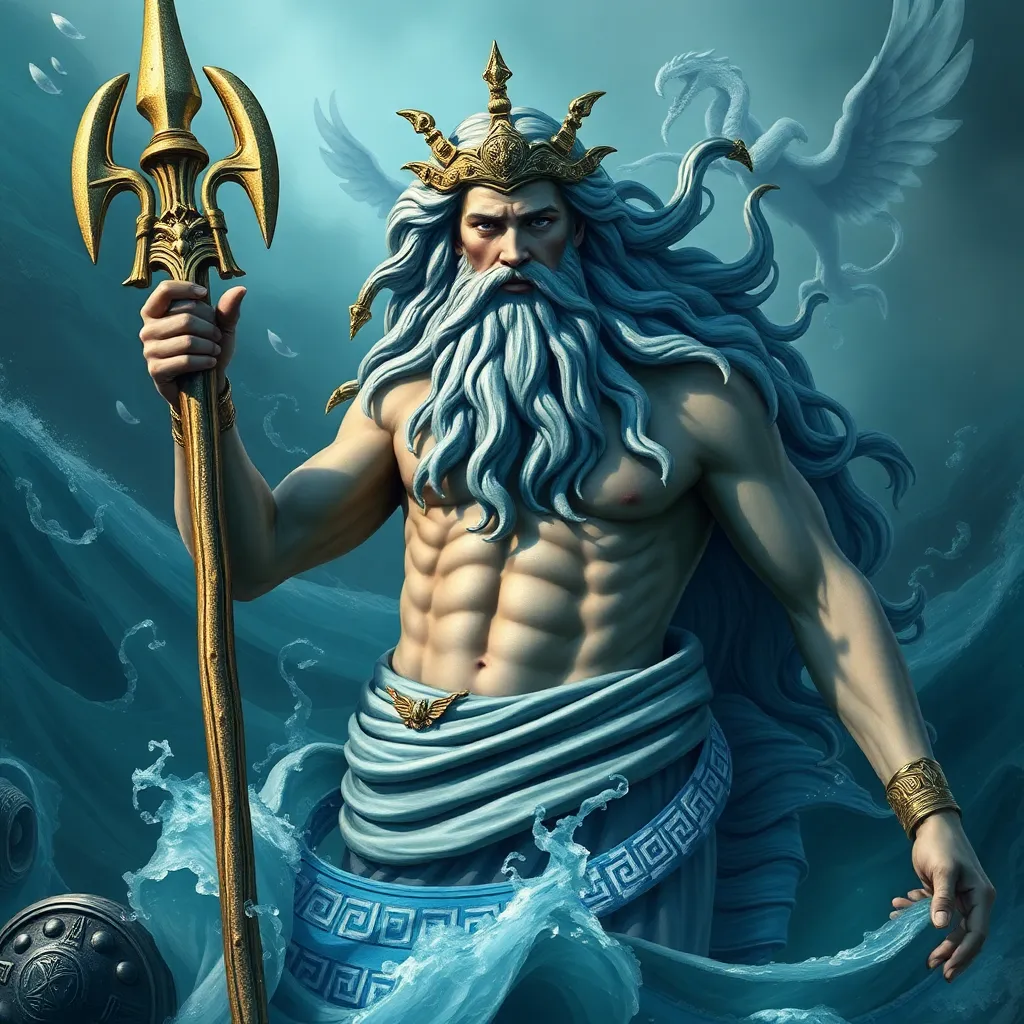Poseidon in Roman Mythology: Neptune and His Greek Counterpart
I. Introduction
In the vast pantheon of Greek mythology, Poseidon stands out as one of the principal deities, revered as the god of the sea, earthquakes, and horses. His significance in ancient Greek culture is profound, symbolizing not only the power of the ocean but also the unpredictability of nature. In Roman mythology, Poseidon’s counterpart is Neptune, a deity who embodies similar attributes yet diverges in various cultural aspects. Studying these parallels and differences provides valuable insights into how ancient civilizations understood and revered their deities.
II. Origins and Etymology
The name “Poseidon” is derived from the ancient Greek word “posis,” meaning “husband” or “lord,” combined with “da,” which denotes the earth. This etymology highlights his dominion over the earth and the sea, emphasizing his strength and authority.
On the other hand, the name “Neptune” has Latin origins, believed to be derived from the Indo-European root word “nebh-“, meaning “moist” or “wet.” This connection aligns Neptune more closely with freshwater bodies, illustrating the cultural emphasis the Romans placed on rivers and springs alongside the sea.
Historically, both deities emerged from a rich tapestry of myths and legends, evolving through generations and reflecting the values of their respective societies.
III. Domains and Attributes
Poseidon is primarily known as the god of the sea, but his influence extends to earthquakes and horses. He wields a powerful trident, a three-pronged spear that symbolizes his dominion over aquatic realms. Additionally, he is often depicted with horses, which he is said to have created, further solidifying his connection to both land and sea.
Neptune shares many of these attributes, being associated with freshwater and the vast oceans. His representation often includes aquatic creatures, such as dolphins and fish, showcasing the Romans’ appreciation for the sea’s bounty. Both deities are frequently depicted as powerful figures, commanding respect and fear.
- Poseidon: God of the sea, earthquakes, horses
- Neptune: God of freshwater, the sea
- Common Symbols: Trident, horses, aquatic creatures
IV. Mythological Narratives
Poseidon features prominently in numerous Greek myths. One notable story is the creation of horses, where he is credited with bringing forth these majestic creatures from the sea. Another significant myth involves his contest with Athena for the patronage of Athens. Poseidon struck the ground with his trident, creating a saltwater spring, but Athena offered the olive tree, which the city ultimately chose, showcasing the value placed on agriculture.
Neptune also appears in notable Roman narratives, particularly in Virgil’s “Aeneid.” Here, he plays a crucial role in guiding and protecting Aeneas during his journey, reflecting the Roman view of him as a guardian of sailors and naval power. His influence was integral to the expansion of Roman naval capabilities, symbolizing strength and supremacy over the seas.
V. Worship and Cult Practices
In ancient Greece, Poseidon was worshipped in various temples across the coastline, with festivals such as the Isthmian Games being held in his honor. These celebrations included athletic competitions and sacrifices, emphasizing his importance to sailors and those dependent on the sea.
Conversely, Roman worship of Neptune was characterized by different practices, including the Neptunalia festival, which celebrated freshwater sources. Temples dedicated to Neptune were often located near rivers and lakes, highlighting the Roman emphasis on freshwater alongside the sea.
- Poseidon Worship: Temples, Isthmian Games
- Neptune Worship: Neptunalia festival, river temples
The differences in their ritual practices reflect the distinct cultural values of the Greeks and Romans, with Poseidon embodying the chaotic and powerful nature of the sea, while Neptune was seen as a more stable and nurturing figure.
VI. Cultural Influence and Legacy
Poseidon’s influence on Greek art, literature, and philosophy is significant. He appears in countless works of literature, from Homer’s epics to various tragedies, symbolizing both the fear and reverence of the natural world. His image has been immortalized in statues, pottery, and mosaics, illustrating his importance in Greek culture.
Neptune, too, has left a lasting mark on Roman art, literature, and architecture. Statues of Neptune often adorned public spaces, and he was frequently depicted in mosaics and frescoes that celebrated the sea’s grandeur. Moreover, Neptune’s name has influenced modern language, particularly in terms of maritime terminology.
- Poseidon’s Legacy: Influence on art, literature, philosophy
- Neptune’s Legacy: Representation in Roman art, architecture
The enduring nature of these figures is evident in contemporary society, where they continue to inspire literature, film, and various forms of media.
VII. Comparative Analysis
When examining the similarities between Poseidon and Neptune, it is clear that both share fundamental attributes and roles. They are both gods of the sea, wielding tridents and associated with horses and aquatic life. Their myths often overlap, reflecting common themes of power and the unpredictability of nature.
However, differences in their characterization and cultural significance are equally notable. Poseidon is often portrayed as a more tumultuous and vengeful god, embodying the fearsome aspects of the sea. In contrast, Neptune is depicted as a more benevolent protector, highlighting the Roman value of civilization and control over nature.
- Similarities:
- Shared attributes and roles
- Common myths and depictions
- Differences:
- Divergent attributes and powers
- Variations in mythology and worship
VIII. Conclusion
In summary, the exploration of Poseidon and Neptune reveals a complex interplay between two cultures that revered similar yet distinct deities. Understanding Neptune as a continuation of Poseidon’s legacy emphasizes the significance of these mythological figures in shaping human perceptions of nature. Their enduring presence in modern culture speaks to their universal themes of power, respect for the natural world, and the human experience.
Ultimately, the study of Poseidon and Neptune enriches our understanding of ancient mythologies and their relevance in contemporary society, reminding us of the timelessness of these powerful symbols.




